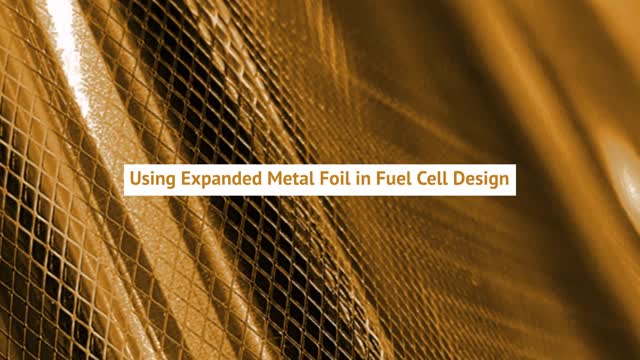Fuel cell manufacturers are consistently dedicated to enhancing their products’ versatility, durability, and cost-effectiveness. They explore various methods to achieve these objectives, such as innovative designs and materials. An increasingly favored strategy among fuel cell manufacturers is the integration of expanded metal foil into their fuel cell designs, as it presents significant advantages in pursuing these goals.
CThru Mesh™ precision expanded metal foils find utility across multiple layers within a fuel cell stack. We’re committed to working closely with you to precisely manufacture your dimensional requirements, achieving the desired balance of conductivity and weight for your specific fuel cell needs.
Why Use Expanded Metal Foil in Fuel Cells
When confronted with weight restrictions and the imperative to create the lightest possible fuel cell, opting for expanded metal foil is an ideal choice. This material, characterized by its remarkable combination of lightweight properties and robustness, requires a lower quantity of metal per unit area. The ability to eliminate scrap and employ lighter metals proves highly advantageous. Integrating expanded metal foil into your fuel cell applications can curtail material costs and elevate the performance and longevity of your product. Harnessing the potential of expanded metals can result in comprehensive enhancements to your product designs.
Benefits of Expanded Metal Foil in Fuel Cells
Implementing expanded metal foil into your fuel cell design offers the following benefits:
- Versatility: The flexibility of expanded metal foil strongly appeals to manufacturers across diverse industries with various applications. Given that different types of fuel cells demand varying metals and specific properties, expanded metal foils provide the broadest range of options, capabilities, and resources.
- Conductivity: Expanded metal foil crafted from a single solid metal sheet excel as conductors. Their conductivity remains consistent, unaffected by pressure-induced strand movement. This uniformity is critical for the efficiency of fuel cell stacks, ensuring consistent performance across cell layers. Expanded metals exhibit electrical conductivity and effectively conduct magnetic flux and thermal heat, further enhancing fuel cell performance.
- Strength-to-Weight Ratio: The structural integrity of a metal is a key consideration in material selection for applications. However, opting for expanded metal foil over a solid metal sheet offers distinct advantages.
- Maximized Surface Area at Reduced Costs: When working with precious metals like niobium, zirconium, nickel, silver, or titanium, expanding the metal foil minimizes material costs. Expanded metal foils are considerably more cost-effective than similar perforated or woven products.
Fuel Cell Applications
Expanded metal foil offers significant design advantages, accommodating thin foils of precious metals like nickel, titanium, zirconium, and silver. Fuel cell manufacturers continually prioritize enhancing their products’ versatility, durability, and cost-effectiveness. To achieve these goals, they explore various avenues, including innovative designs and the adoption of new materials. Many fuel cell manufacturers integrate expanded metal foils into their designs to achieve these objectives.
Custom Expanded Metal Foil Solutions From CThru Metals
When selecting an expanded metal foil company, it is important to choose a partner that understands and meets your needs and requirements. At CThru Metals, we collaborate closely with your team to identify the right material, size, and configurations for your expanded metal project. With our extensive experience in the expanded metal and metal fabrication industries, you can trust us to efficiently handle the job. Feel free to contact us for more information or to request a quote.



